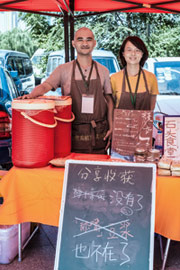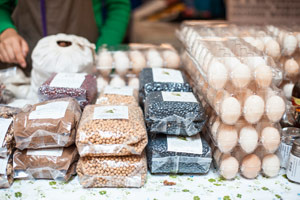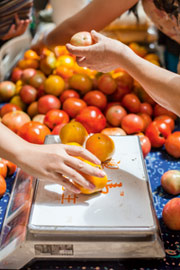Beijing’s Farmers’ Market

Simply sign up to the Life & Arts myFT Digest -- delivered directly to your inbox.
Saturday morning in the capital and there are uncharacteristically blue skies. The US embassy’s BeijingAir Twitter feed, which measures particulates in the city’s air, has plummeted overnight from a “very unhealthy” 157 to just 32, just above the World Health Organisation’s guideline standard of 25.
Under these auspices, in the shadow of a large residential development and within earshot of a major ring road, the Beijing Farmers’ Market opens for business, a strong breeze bending the willow trees along its perimeter. Hundreds of shoppers browse the organic vegetables, home-made cheeses and aromatic vats of soyabean milk. Across the makeshift plaza, pig farmer Si Guiquan proudly displays health inspector reports and other documents attesting to the quality of his pork cuts. Another farmer, Lin Jian, crouches next to a table of organic eggs, trying to convince a child that even his pumpkin chicken feed is delicious. “Everything on my farm can be recycled,” Lin boasts. “The pumpkins I can’t sell I feed to my chickens.”
The Beijing Farmers’ Market began life as a foreign-inspired fad run by a small group of expatriate artists but, three years on, it has become one of Beijing’s premier foodie paradises, where dozens of farmers, cheese makers and other self-professed “artisans” enjoy a thriving trade every weekend.
“It was mostly those artists and their friends [at the beginning],” says Chang Tianle, a former journalist and one of the founding members who willed the market into its current state of rude health. “Very few people actually did any shopping. They came, they had a good time, but they didn’t sell much. I said that if they wanted me to be involved, I wanted more people to come.”
The market is homeless, moving to a new location for each session, advertised a few days in advance on Facebook and Weibo, China’s Twitter equivalent. “Weibo spread the word to people beyond the artists’ small circle,” Chang says. “Many people now depend on us for their weekly grocery shopping.”

Despite its unpredictability the market attracts as many as 2,000 people over a four-hour session. It also reflects a growing passion for healthy produce in a country better known for its environmental failings. Some of the shoppers are sceptical newcomers, others convinced regulars.
Michelle Garnaut, owner of two of China’s best-known restaurants, Capital M in Beijing and Shanghai’s M on the Bund, says that the interest in organic food is “enormous … People are so concerned about food-safety issues. Many people don’t trust the air, the food or the water.”
Some people involved in the Beijing Farmers’ Market – and a growing number of markets like it – also have grave reservations about the country’s headlong pursuit of economic growth. “Urbanisation has been too fast,” says Shi Yan, who runs two organic farms outside Beijing in co-operation with local villagers. “Can the huge cities we are building really support that many people and jobs?”
From an initial supplier base of just five or six organic farms on the outskirts of Beijing, the market is now serviced by dozens of suppliers from much further afield. It recently highlighted produce from a farm damaged by severe flooding in northeastern Heilongjiang province. At another stall displaying fresh breads and pastries, baker Jennifer Yeh and her daughter Nanda worry about floods closer to home in Hebei province, which surrounds Beijing. “Everyone assumes we use imported flour. But no, I only source locally,” she says. “We’re down to seven bags because of the floods.”

Bob Lewis, special assistant for market development for the state of New York’s agriculture department, says: “The urban-rural connection is at the heart of this movement.” Lewis, who visited the Beijing Farmers’ Market last month, was in China to attend a conference hosted by the country’s Agricultural Wholesale Markets Association. “Markets are such a universal experience. They really are a community service, not a business, and need to be recognised for that.”
Lewis has been involved in farmers’ markets – including New York’s Union Square – for more than 30 years. Though the Beijing Farmers’ Market is much smaller, Lewis was impressed by what he saw there, from the brightly coloured stalls to a remarkable cheese ice-cream made from whey that would otherwise go to waste. “Lots of colours attract kids. We need to use whatever tools we can to break through that consumer smokescreen,” he says, referring to the commercial power of America’s massive processed-food groups.

The cheese ice-cream was the brainchild of Liu Yang and his staff at Le Fromager de Pekin. Liu studied in Paris for his management degree but also completed a cheesemaking degree in Corsica. Like Shi, he is wary of growth for growth’s sake: “I’m not interested in becoming bigger and opening a factory,” he says, despite increasing demand for his cheeses from both market customers and local restaurants. “I want to stay small, maybe open another store, but that’s it.”
Chang, meanwhile, struggles with more mundane matters, such as the logistical arrangements with her market’s revolving cast of sponsors. Usually they are large department stores or other retailers, who like the traffic it brings to their establishments. Last month the market was hosted by a real estate developer hoping to cross-sell holiday villas in Hainan, an island province in the South China Sea.
“We don’t have any legal status even though we’ve been running this for three years and it has become a big public event,” says Chang. “We actually had a discussion with some government officials last month about what we were doing and how they might be able to support us. They were quite surprised to find out we are nothing but a small group of people.”
Tom Mitchell is an FT Beijing correspondent
Comments